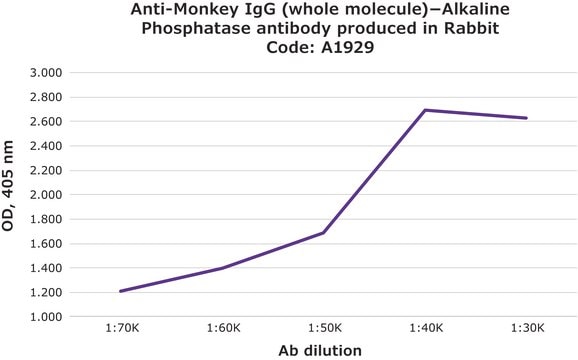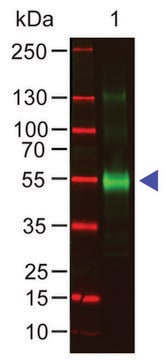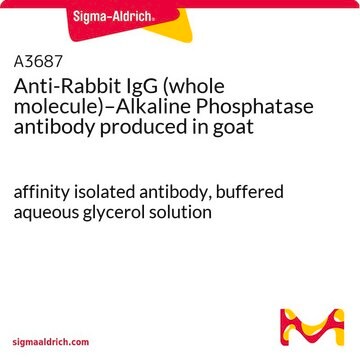A2054
Anti-Monkey IgG (whole molecule)−Peroxidase antibody produced in rabbit
affinity isolated antibody, buffered aqueous solution
Sinónimos:
Rabbit Anti-Monkey IgG (whole molecule)-HRP
About This Item
Productos recomendados
origen biológico
rabbit
conjugado
peroxidase conjugate
forma del anticuerpo
affinity isolated antibody
tipo de anticuerpo
secondary antibodies
clon
polyclonal
formulario
buffered aqueous solution
reactividad de especies
monkey
técnicas
direct ELISA: 1:45,000
dot blot: 1:160,000 (direct chemiluminescence assay)
Condiciones de envío
dry ice
temp. de almacenamiento
−20°C
modificación del objetivo postraduccional
unmodified
Categorías relacionadas
Descripción general
Horseradish Peroxidase (HRP) is an enzyme that catalyzes the conversion of chromogenic substrates such as o-phenylenediamine (OPD), 4-chloro-1-naphthol 3,3′,5,5′-tetramethylbenzidine (TMB), 3,3′-Diaminobenzidine (DAB) or 2,2′-azino-bis(3-ethylbenzothiazoline-6-sulphonic acid) (ABTS); chemiluminescent substrates such as CPS-3 (enhanced luminal) and fluorogenic substrates such as Ampliflu™ Red into detectable chromophores, light-emitters or fluorescers, respectively.
Inmunógeno
Aplicación
Acciones bioquímicas o fisiológicas
Forma física
Nota de preparación
Información legal
Cláusula de descargo de responsabilidad
Not finding the right product?
Try our Herramienta de selección de productos.
Palabra de señalización
Warning
Frases de peligro
Consejos de prudencia
Clasificaciones de peligro
Skin Sens. 1
Código de clase de almacenamiento
12 - Non Combustible Liquids
Clase de riesgo para el agua (WGK)
WGK 2
Punto de inflamabilidad (°F)
Not applicable
Punto de inflamabilidad (°C)
Not applicable
Certificados de análisis (COA)
Busque Certificados de análisis (COA) introduciendo el número de lote del producto. Los números de lote se encuentran en la etiqueta del producto después de las palabras «Lot» o «Batch»
¿Ya tiene este producto?
Encuentre la documentación para los productos que ha comprado recientemente en la Biblioteca de documentos.
Los clientes también vieron
Nuestro equipo de científicos tiene experiencia en todas las áreas de investigación: Ciencias de la vida, Ciencia de los materiales, Síntesis química, Cromatografía, Analítica y muchas otras.
Póngase en contacto con el Servicio técnico










